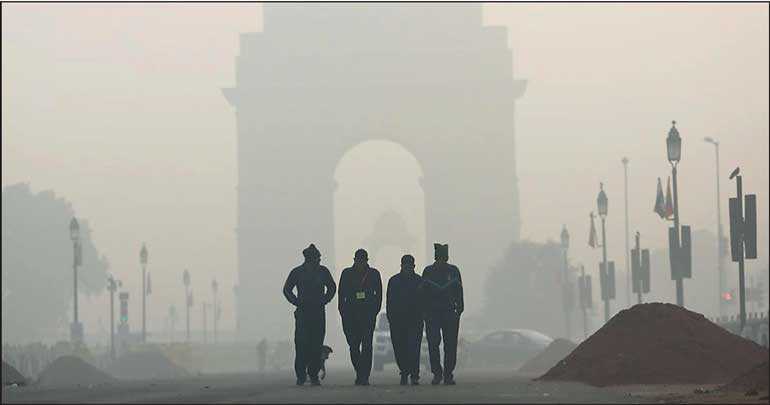Friday Feb 20, 2026
Friday Feb 20, 2026
Thursday, 14 November 2019 00:00 - - {{hitsCtrl.values.hits}}

NEW DELHI (Reuters) - As New Delhi remained shrouded in toxic smog on Wednesday, India’s top court censured the central government for its inaction and sought remedial action.
Cooler temperatures and lighter wind trapped heavy smog over the Indian capital, pushing pollution to “severe” levels in many places with no immediate relief in sight, government agencies said.
“The whole of North India is suffering and not much has been done by the government,” Supreme Court Chief Justice Ranjan Gogoi and Justice S.A. Bobde said.
The overall air quality index (AQI) in Delhi was 494, according to the monitoring agency SAFAR.
The index measures the levels of airborne PM 2.5 - particles that can reach deep into the lungs. Anything above 60 is considered unhealthy.
With the cool season setting in, the city was likely to suffer for weeks.
“Now that it is getting colder, air is not rising high enough to disperse pollutants. The whole trapping is happening close to the ground,” said Anumita Roy Chowdhury, an executive director at Centre for Science and Environment, a Delhi-based research and advocacy organisation.
The Central Pollution Control Board said pollution levels had touched 500 in some parts of the city, meaning danger for healthy people, not just those suffering from existing conditions.
As air quality remained hazardous, Prince Charles, heir to the British throne, was in New Delhi on a two-day visit.
He is on his 10th official visit to India, focusing on climate change, sustainable markets and social finance.
On his first day in smoggy Delhi, Charles, 70, visited the India Meteorological Department and the Delhi War cemetery, among other sites, and was seen everywhere in open areas without a protective mask.
The prince’s Clarence House office declined to comment.
Delhi’s smog could get even worse, SAFAR said, as farmers burning stubble in areas around the city have been generating clouds of acrid smoke.
“No sudden recovery is expected under this condition at least for the next two days and AQI is likely to deteriorate further,” it said.
The city government is restricting private cars until Nov. 15 with an “odd-even” system based on licence plates, but Roy Chowdhury was not optimistic it would help much, given the weather.
“Emergency measures cannot clear the air up when there is no wind to blow pollution away. It is a day-to-day battle right now,” she said.
Delhi’s chief minister Arvind Kejriwal said his government could extend the “odd-even” scheme, if required.